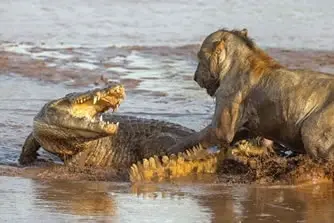A fight, undertaken with all one’s efforts and with the intensity of a wild animal.
Tooth and nail
What's the meaning of the phrase 'Tooth and nail'?
What's the origin of the phrase 'Tooth and nail'?
‘Tooth and nail’ clearly alludes to the fights that are undertaken by wild animals when hunting prey.
The expression has a long history and is one of the older phrases in English that is still in everyday use. The original form when referring to a ‘no holds barred’ fight was ‘with tooth and nail’ and it was used that way in the earliest example that is known in print – Sir Thomas More’s In A Dialogue of Comfort and Tribulation, circa 1535:
They would fayne kepe them as long as euer they mighte, euen with tooth and nayle.
More is one of the very few English noblemen to become a saint of both the Roman Catholic and Anglican churches. His refusal to toe Henry VIII’s line concerning religion ended with him being tried for high treason by Henry’s court in 1535.
More wrote the above line as part of an imaginary dialogue between an old man and a young man who feared he would be executed if he didn’t renounce his Christian faith.
Clearly More’s text related to his own situation and he stoically refused to change his position, even though he knew it would end in execution. In the Dialogue he advised the young man that, if he held to his faith he would be:
Hawsed [a.k.a. ‘hoisted’] vp into heauen, and bee with God by and by.
See also ‘Red in tooth and claw‘.
The history of “Tooth and nail” in printed materials
Trend of tooth and nail in printed material over time
Related phrases and meanings
Browse more Phrases
About the Author

Phrases & Meanings
A-Z
A B C D E F G H I J K L M N O P Q R S T UV W XYZ
Categories
American Animals Australian Bible Body Colour Conflict Death Devil Dogs Emotions Euphemism Family Fashion Food French Horses ‘Jack’ Luck Money Military Music Names Nature Nautical Numbers Politics Religion Shakespeare Stupidity Entertainment Weather Women Work
How did we do?
Have you spotted something that needs updated on this page? We review all feedback we receive to ensure that we provide the most accurate and up to date information on phrases.
